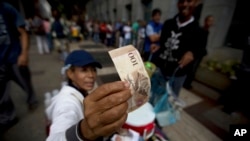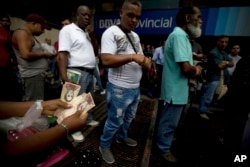Venezuelans took a break from lining up to buy food and medicine Tuesday and waited with hundreds of others to deposit bank notes about to become worthless.
President Nicolas Maduro made a surprise announcement this week that the 100-bolivar note will be taken out of circulation Wednesday. It is the country's largest-denominated bill and the most widely used.
Monday was a bank holiday, so starting Tuesday morning people lined up before the banks opened to deposit the 100-bolivar notes into their accounts. Wealthier Venezuelans skipped the lines and spent backpacks full of bills at restaurants and upscale shopping centers.
People working in the informal sector who keep their savings in cash talked gloomily at taxi stands and street kiosks. About one-third of Venezuelans don't have bank accounts, and so have no way to deposit the soon-to-be-worthless bills. The 100-bolivar note fell in value this year from 10 cents to 2 cents. Some are using the bills to decorate Christmas trees, or handing them out as party favors at bars.
Maduro has promised to release higher-denomination notes this week amid the world's highest inflation. But economists say the rollout will not be fast enough to replace the 100-bolivar note and avoid a temporary freeze on cash transactions.
On Monday, Maduro shut down the border with Colombia, saying a 72-hour closure was needed to attack “mafias” that are destabilizing the economy by hoarding hard-to-find bolivar notes and sending them back across the border for huge gain. Critics mocked the idea that gangsters would keep their wealth in the world's fastest-devaluing currency.
The opposition planned to take up congressional impeachment proceedings against the embattled socialist president on Tuesday afternoon. Lawmakers had been holding largely symbolic impeachment hearings against Maduro in October. They put the campaign on hold to engage in Vatican-mediated negotiations with the government, but those talks fell apart last week after the opposition walked away to protest the government's lack of concessions.
But few people were paying attention to the session Tuesday and the National Assembly building was all but abandoned as politics took a backseat to the currency chaos.





